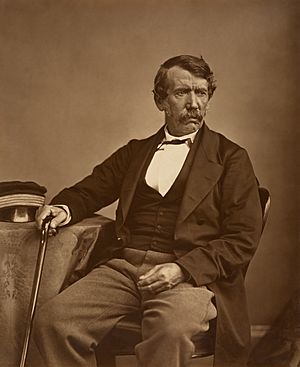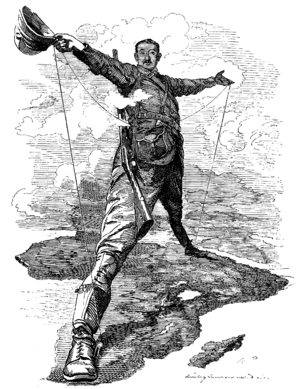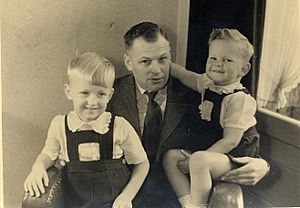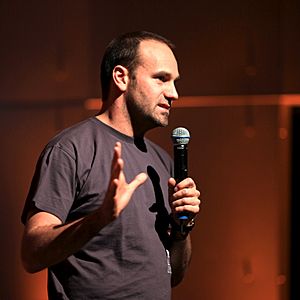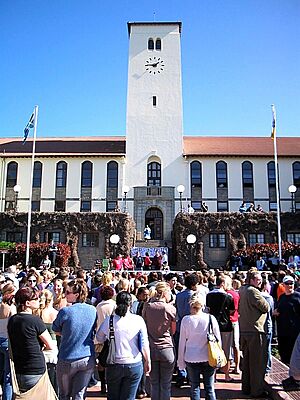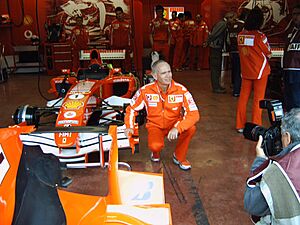British diaspora in Africa facts for kids
| Total population | |
|---|---|
| 2–2.5 million | |
| Regions with significant populations | |
| 1,600,000 | |
| 40,000 | |
| 32,000 | |
| 30,000 | |
| Languages | |
| First language English Second or third language Afrikaans · Bantu languages · European languages |
|
| Religion | |
| Anglicanism · Protestantism · Roman Catholicism · Judaism · Irreligion | |
| Related ethnic groups | |
| British · English · Scottish · Irish · Welsh · Ulster-Scots · Coloureds · Afrikaners | |
The British diaspora in Africa refers to English-speaking white people of mostly British background. They live in or come from countries in Sub-Saharan Africa. Most of them live in South Africa and other southern African nations. These include Zimbabwe, Namibia, Kenya, Botswana, and Zambia. English is usually their first language. Many white Africans who speak English first are of British and Irish heritage.
Contents
History of British People in Africa
Early British Settlements in Africa
British settlements first appeared at ports along the West African coast. These were mainly for the Atlantic slave trade. More lasting British settlement in Africa began in the late 1700s. This happened at the Cape of Good Hope. British settlement grew after Britain took over the Dutch Cape Colony in 1806.
In 1820, the government encouraged British settlers to move to Albany. This helped Britain control the eastern border of the British Cape Colony. This was during the Xhosa Wars against the Xhosa. Later, Natal in southeastern Africa became a British colony in 1843. After the Second Boer War in 1902, Britain took control of the Boer Republics. These were the Transvaal Republic and the Orange Free State.
Scottish medical missionary David Livingstone explored much of Africa. He was likely the first European to see Victoria Falls in 1855. He is an important figure in African history. He was one of the first well-known Britons to feel a deep connection to Africa.
Expansion and Discoveries
In the late 1800s, gold was found in Witwatersrand. Diamonds were discovered in Kimberley. This led more British, Australians, Americans, and Canadians to settle there. The search for minerals also pushed expansion north. Mining leader Cecil Rhodes dreamed of a British Africa. He wanted it linked from Cape Town to Cairo.
His company, the British South Africa Company, was founded in 1889. It controlled the land named Rhodesia after him. This land later became (Southern) Rhodesia and Northern Rhodesia (now Zimbabwe and Zambia). At the same time, British settlers moved into the fertile uplands. These were called the "White Highlands" in British East Africa (now Kenya).
African Independence Movements
After World War II, many African countries gained independence. This was because of growing movements against colonial rule. In British colonies, African people were the vast majority. But they had been denied political and economic power for a long time. These former colonies eventually became self-governing.
During this time, black nationalist groups fought for majority rule. This usually meant "one man, one vote". Examples include the Mau Mau in Kenya and ZANU in Rhodesia.
Zimbabwe's Journey to Independence
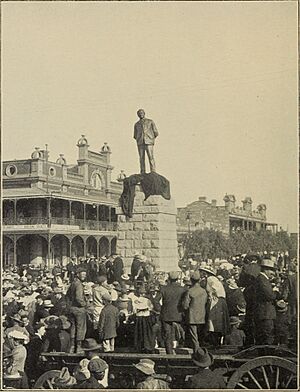
In 1965, the white minority government in Southern Rhodesia declared independence. They called their country Rhodesia. However, they did not include the black African majority as political equals. A civil war followed, lasting until 1979.
In 1980, the first democratic election was held in what was now independent Zimbabwe. The country joined the Commonwealth. After this, the white population in Zimbabwe decreased a lot. Many left their homes and properties. This was because of past unfair rules where white people owned most of the land. Zimbabwe faced challenges, and in 2002, it was suspended from the Commonwealth. It then chose to leave the Commonwealth in 2003.
Northern Rhodesia became a separate country called Zambia.
South Africa's History
White Minority Rule in South Africa
In 1910, four separate British colonies in Southern Africa joined together. They formed the Union of South Africa. This country was ruled by a white minority. It was a constitutional monarchy within the British Empire. In 1926, the Balfour Declaration gave South Africa more independence from Britain. It became a founding member of the Commonwealth of Nations.
The British people in South Africa mostly supported the United Party. This party wanted close ties with the United Kingdom and the Commonwealth. However, the Afrikaners, another white group, ruled the country from 1948 to 1994. They created a system of racial separation called apartheid. They also made South Africa a republic and left the Commonwealth. Many British people voted against becoming a republic in 1960, but it passed.
South Africa Becomes a Democracy
In 1994, South Africa held its first democratic election. This ended apartheid and white minority rule. The country then rejoined the Commonwealth. Most British people in South Africa now support the Democratic Alliance. This party is the main opposition to the ruling African National Congress.
The number of British people in South Africa has gone down since the early 1990s. This is due to lower birth rates and people moving away. Some reasons for leaving include challenges like crime and changes in job rules. About 1.6 million white South Africans speak English as their first language. This group includes people of British descent. This number is about 36% of the white population.
Even with people moving away, many British people still settle in South Africa. This includes South Africans who were born there and have returned. South Africa is also a popular place for British retirees. Many white Zimbabweans of British descent also moved to South Africa after Zimbabwe's independence.
British People Around the World
Many British people from Africa have moved to other Commonwealth countries. These include the United Kingdom, Australia, New Zealand, and Canada. Others have settled in countries like the United States, Republic of Ireland, and France. Many young people also use working holiday visas to live and work in the UK and other Commonwealth nations.
Culture of British Africans
White Africans, including those of British descent, often enjoy outdoor activities and sports. The braai (a type of barbecue) is a popular way to gather with friends and family. Other fun activities include visiting game reserves, hiking, camping, and fishing. Many also love country life and farming. Their culture also comes from their British background. Afternoon tea is still common, as are hobbies like gardening and reading. Families in the countryside often enjoy horse riding and shooting.
Language and Dialects
Many white Africans speak a special kind of English. It has been shaped by other local languages. South African English is influenced by Afrikaans and Bantu languages. You can see the Afrikaans influence in words like braai, trek, lekker, and ja. Some Zulu and Xhosa words are also used. These include shongololo, muti, ubuntu, and fundi (meaning "expert"). A common greeting is "howzit!", which comes from the Afrikaans hoezit!.
Zimbabwean English (ZimEng) is similar to English spoken in Australia, New Zealand, and South Africa. But it is also unique. It was mainly influenced by British English. It had less influence from Afrikaans and African languages. After Zimbabwe became independent in 1980, the older "Rhodesian English" accent became less common. Today, English, Shona, and Ndebele are the main languages. English is the official language. It is used in schools, businesses, government, and media.
Rhodes University in Grahamstown has a special unit for South African English. It helps study and record the language. The English Academy of Southern Africa also works to promote English in Southern Africa.
Here are some unique South African English words:
| bru | male friend, from Afrikaans broer meaning "brother" |
| (my) china | (my) friend, from Cockney "china plate" which is rhyming slang for "mate" |
| just now, now now |
an amount of time, could be anything from 5 seconds to 24 hours, could be past or future tense, from the Afrikaans net-nou and nou-nou (e.g. "He went out just now." or "I'll be done with it now now.") |
| no | common speech disfluency or filler |
| oke | male friend, either shortened from bloke or from the Afrikaans diminutive 'outjie' (oldie, used as a term of affection much like 'guy' in English, with English pronunciation approximating 'oakie') |
| robot | traffic light |
| sarmie | sandwich |
| scheme | to think, as in the expression, "What are you scheming?" asked of a person deep in thought (e.g. "I scheme we should go home now.") |
| shot | thank you |
| takkies | running shoes |
| tune | to talk to someone in a derogatory way (e.g. "Are you tuning me?") |
Literature and Arts
The British people in Africa have a long history of writing. They have produced many famous novelists and poets. These include Doris Lessing, Olive Schreiner, Guy Butler, and Roy Campbell. A classic South African storybook is Percy FitzPatrick's Jock of the Bushveld. It tells about his journey as a wagon driver with his dog Jock. Other important writers include Nadine Gordimer and Alan Paton.
The British diaspora has also influenced modern African arts. They often mix in other African cultures. Athol Fugard is a very important playwright. He wrote in English to reach more people. Sharlto Copley is a well-known film actor and director. He starred in the Oscar-nominated movie District 9. This film used ideas from South Africa's apartheid history.
Music and Entertainment
Famous African musicians of British descent include Dave Matthews and Johnny Clegg. Wrex Tarr sang the funny Rhodesian song "Cocky Robin". John Edmond was a popular singer during the Rhodesian Bush War. Seether is a rock band started by South Africans.
Education and Learning
British people and their ancestors have helped start many schools and universities in Africa.
Universities in South Africa
Four universities in South Africa were started by the British diaspora. These include the University of Cape Town and the University of KwaZulu-Natal. The University of the Witwatersrand started in Kimberley in 1896. It is now in Johannesburg. Finally, Rhodes University was founded in 1904.
Schools for All
There are two types of schools started by British people or missionaries. Some were for the children of British settlers. Others were for the local African population.
The first type includes famous private schools like St. George's College in Harare. It also includes important government schools like Maritzburg College in Pietermaritzburg.
The second type includes South African schools like Lovedale. This school educated many important Africans, including Thabo Mbeki. Many of these schools faced problems because of the Bantu Education Act of 1953. This law made education unfair for black students. Now, projects are working to improve these historic schools.
Sports and Athletics
Cricket, rugby, tennis, golf, and cycling are very popular sports among the British diaspora.
Cricket in Africa, especially Zimbabwe, has seen many players of British heritage. Famous Zimbabwean players include Andy Flower and Heath Streak. In South Africa, players like Graeme Smith and Shaun Pollock have been important. The England cricket team has also had many players from Southern Africa.
In rugby, Kitch Christie coached the Springboks to win the 1995 Rugby World Cup. Other notable players include Bobby Skinstad and Percy Montgomery.
British people in Africa have also done well in rallying. Rhodesia produced world champion motorcycle racers like Jim Redman. Two-time Tour de France winner Chris Froome was born in Kenya and grew up in South Africa.
Other Names for British Africans
Most white South Africans and Zimbabweans see themselves as "South African" or "Zimbabwean." This is true no matter their first language or family background. The term English-speaking South African (ESSA) is sometimes used. It helps tell them apart from other groups, like Afrikaners.
Some informal terms for British people in Africa exist. One is the Afrikaans term rooinek. This means "red neck." It might come from the idea that they sunburn easily. Another term is 'Beberu' in Kenya, which means he-goat.
The term Anglo-African has been used in the past. It described people living in the British Empire in Africa. It has also been used by people with both British and African family roots.
'Cape Brit' is another term for South Africans of British descent. It refers to the Cape Colony. Many South Africans can trace their family origins to immigrants who settled there.
Famous Africans of British Descent
Explorers, Leaders, and Business People
- Roy Bennett (1957-2018), Zimbabwean politician
- Verney Lovett Cameron (1844–1894), explorer
- Rob Davies (born 1948), South African Member of Parliament
- Rufane Shaw Donkin (1773–1841), founder of Port Elizabeth
- Emily Hobhouse (1860–1926), welfare campaigner
- Trevor Huddleston (1913–1998), Anglican archbishop, anti-apartheid activist
- Sir Leander Starr Jameson (1853–1917), doctor and colleague of Cecil Rhodes
- David Livingstone (1813–1873), medical missionary and explorer
- John X. Merriman (1841–1926), last Prime Minister of the Cape Colony
- Elon Musk (born 1971), Internet and technology entrepreneur, founder of SpaceX and Tesla Motors
- Nicky Oppenheimer (born 1945), chairman of De Beers
- Cecil Rhodes (1853–1902), businessman and politician
- Guy Scott (born 1944), Vice President of Zambia
- Mark Shuttleworth (born 1973), Internet entrepreneur, space tourist
- Harry Smith (1787–1860), Governor of the Cape Colony
- Ian Smith (1919–2007), Prime Minister of Rhodesia
Writers, Scientists, and Journalists
- Allan MacLeod Cormack (1924-1998), physicist
- William Boyd (born 1952), writer
- Robert Broom (1866–1951), doctor and paleontologist
- Guy Butler ( 1918–2001), author, poet and playwright
- Roy Campbell (1901–1957), poet
- Bryce Courtenay (1933–2012), author
- Richard Dawkins (born 1941), evolutionary biologist, author
- Percy FitzPatrick (1862–1931), author
- Athol Fugard (born 1932), author, actor and playwright
- Alexandra Fuller (born 1969), author
- Peter Godwin (born 1957), author and journalist
- Nadine Gordimer (1923-2014), author, Nobel Prize winner
- A. C. Grayling (born 1949), philosopher and academic
- Louis Leakey (1903–1972), palaeoanthropologist
- Mary Leakey (1913–1996), palaeoanthropologist
- Richard Leakey (born 1944), palaeoanthropologist and conservationist
- Doris Lessing (1919-2013), author
- Alan Paton (1903–1988), author
- Olive Schreiner (1855–1920), author
- Wilbur Smith (born 1933), author
- Allister Sparks (born 1933), investigative journalist
- J. R. R. Tolkien (1892–1973), author
Sportspeople, Musicians, and Actors
- Charlene, Princess of Monaco (born 1978), Olympic swimmer
- Kork Ballington (born 1951), motorcycle road racer
- Rory Byrne (born 1944), engineer and Formula One car designer
- Mike Catt (born 1971), rugby player
- Kitch Christie (1940–1998), rugby coach
- Johnny Clegg (1953-2019), musician
- Sharlto Copley (born 1973), film actor, producer and director
- Kirsty Coventry (born 1983), Olympic swimmer
- Andy Flower (born 1968), cricketer, coach
- Chris Froome (born 1985), cyclist
- Richard E. Grant (born 1957), actor, director and screenwriter
- Watkin Tudor Jones (born 1974), rapper, lead vocalist of Die Antwoord
- Dave Matthews (born 1967), musician
- Percy Montgomery (born 1974), rugby player
- Gordon Murray (born 1946), Formula One car designer
- Steve Nash (born 1974), basketball player
- Kevin Pietersen (born 1980), cricketer
- Gary Player (born 1935), golfer
- Shaun Pollock (born 1973), cricketer
- Nick Price (born 1957), golfer
- Jim Redman (born 1931), motorcycle road racer
- Jonty Rhodes (born 1969), cricketer
- Bobby Skinstad (born 1976), rugby player
- Heath Streak (born 1974), cricketer
- Graeme Smith (born 1981), cricketer
- Jordy Smith (born 1988), professional surfer
- Andrew Strauss (born 1977), cricketer
- Brendan Taylor (born 1986), cricketer
- Jonathan Trott (born 1981), cricketer
- Hugo Weaving (born 1960), actor
- Roger Whittaker (born 1936), musician
Images for kids
-
Rory Byrne with Michael Schumacher's car for the 2005 Formula One season
 | Leon Lynch |
 | Milton P. Webster |
 | Ferdinand Smith |


